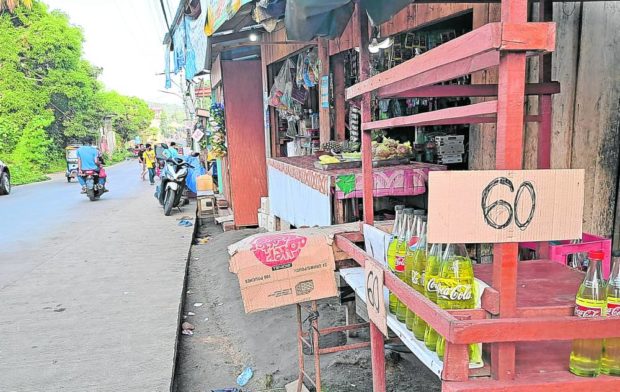
BARTER BENEFITS | A roadside retailer in Bongao, Tawi-Tawi, sells gasoline at P60 a liter on June 13, way much cheaper than prices elsewhere in the country. The “imported” fuel is illegally brought in from Sandakan, Malaysia, via the barter trade that has existed in southern Philippines for centuries. (Photo by BONG SARMIENTO / Inquirer Mindanao)
BONGAO, Tawi-Tawi, Philippines — Amid another round of fuel price increases this week, motorists in this southernmost part of the country still enjoy cheaper gasoline, albeit illegally.
Tricycle drivers here told the Inquirer on Monday that they have not been affected by the series of price hikes imposed by oil companies since local supplies were being sourced from nearby Sandakan, Malaysia, 16 hours away by Ro-Ro or roll-on, roll-off boat.
“We’re lucky here we don’t feel the pinch of soaring fuel prices,” one tricycle driver said.
He said the last time that local fuel prices spiked was during the election period, soaring to P120 a liter, but it immediately went down a few days after the May 9 polls.
At the roadside, a retailer sells both diesel and gasoline at P60 a liter. This is a far cry from P85 a liter of diesel in Zamboanga City, some 12 hours away by boat from Bongao.
The last time pump prices were at P60 a liter in Metro Manila was just before Russia invaded Ukraine on Feb. 24 this year, an event that caused global financial markets to panic, disrupted crude oil supply, and led fuel prices surging around the world.
According to former assemblyman Sulay Halipa, the fuel sold in the province is transported by boat from Malaysia, an oil-producing nation.
Since the supply comes cheap, Halipa said the lower retail price was “a big help to our poor residents here.”
“If our fuel comes from, say, Zamboanga City, small businessmen will never make it well, fishermen will really be greatly affected, and prices of marine products may shoot up,” Halipa told the Inquirer by phone.
Halipa recalled that during the national elections campaign when fuel skyrocketed to P120 a liter, “so many fishermen didn’t fish, and so many families went hungry.”
Ordinarily, a fisherman needs about 10 liters of fuel to set out to sea.
Barter trade
Trading relations between Tawi-Tawi and Borneo has existed for centuries, according to Halipa, a former assemblyman of the Autonomous Region in Muslim Mindanao (ARMM) who is now economic adviser to the provincial government.
A report published by The Asia Foundation in October 2019 titled “Trade in the Sulu Archipelago: Informal Economies Amidst Maritime Security Challenges” noted that the predominance of “barter trade” in the region has led to an environment where goods from Sabah make up a significant portion of the local economy; with rice and other food products, fuels and cooking oils, more readily available than products produced domestically.
“The remoteness of these provinces from Manila, and their close proximity and shared cultural traditions to Malaysia greater incentivize an economy distinct from Philippine markets. Despite these realities, barter trade presently exists in a legal grey zone, and much of the activity is either informal or illegal,” it said.
As such, the price of goods brought in from across the border rises or falls depending on the law enforcement operation of authorities such as the Philippine National Police and the Philippine Navy.
“Prices are stable if there are no apprehensions. These increase if authorities go after the traders,” Halipa noted.
Apart from fuel, the province also gets basic food commodities from Malaysia at much lower prices than if these were to be bought locally.
According to a study done by peacebuilding group International Alert, “rice, sugar, flour, biscuits and palm oil imported from Malaysia are up to 40 percent cheaper than the prices asked in Zamboanga City for the same products.”
At that time, International Alert also documented some 300 cross-border traders, mostly based in Bongao. Aside from Sandakan, which is the closest at 12 hours away by wooden boat from Bongao, traders also frequent the Malaysian ports of Kudat, Labuan and Tawao, the study noted.
The Asia Foundation report detailed the networks of formal and informal actors that included traders, boat operators, suppliers, port operators, laborers and regulatory and security agents—both in the Philippines and Malaysia, each playing a role in both facilitating and limiting cross-border movement of goods and in “sustaining a lucrative yet informal local economy.”
The study found that “corruption in the form of extracting rents and other special arrangements, locally known as ‘kotong,’ are commonly charged by some state agents and others to help facilitate the transport of goods.”
Halipa urged the government to revive the unhampered trading arrangement for the BIMP-Eaga (Brunei-Indonesia-Malaysia-Philippines East Asian Growth Area) communities.
“This is one trading arrangement that will help our economy,” Halipa explained.
RELATED STORIES
Pump prices of fuel may reach P100 per liter
PUV drivers set ‘holiday,’ eye other jobs to get by
Drivers, riders share brunt of fuel price surge